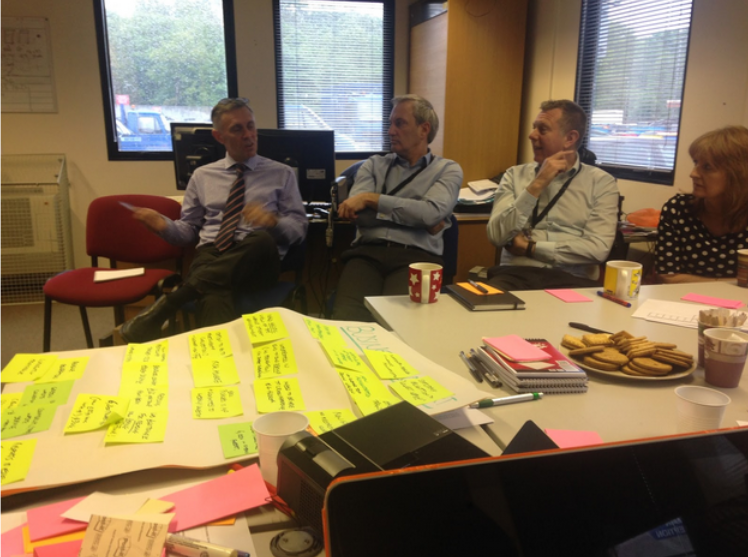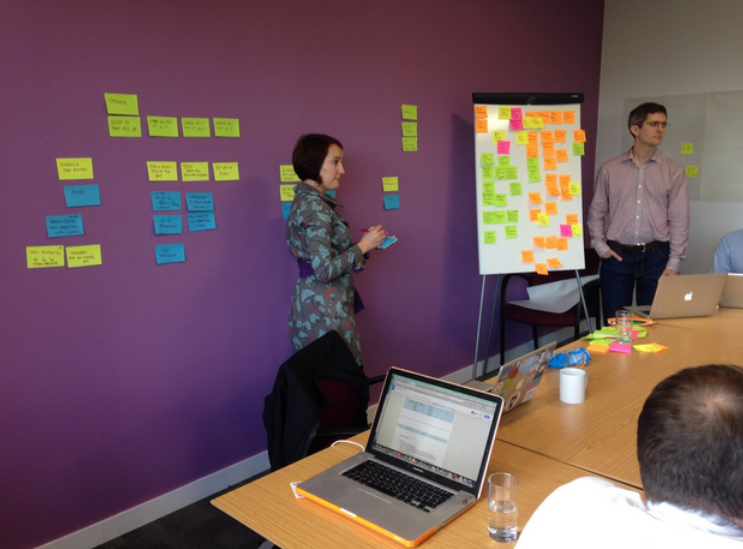by Sarah Prag
 This post is about the approach we’re taking to delivering the Local Waste Service Standard project.
This post is about the approach we’re taking to delivering the Local Waste Service Standard project.
The project aims to apply the Government Digital Service principles of best practice in service design to a local service problem – and this includes working through a number of phases: Discovery, Alpha, Beta and Live.
Beginning at the beginning
I’m a big fan of starting a project with a Discovery phase – it helps the team understand and prioritise the problems to solve and the needs to meet, before then sketching, testing and planning possible solutions. This is a process I’ve often run with small focused teams within organisations, but how would it work this scenario – across five different local authorities, as well as suppliers and other stakeholders, and with only a few months to complete it?
We wanted to get several things out of our Discovery phase:
- Introduce the project – our methods and aims
- Get to know people in the collaborating local authorities
- Introduce and use some agile user-centred techniques
- Learn about the context, needs and priorities of each authority
- Understand their current technical and data set up
- Hear from suppliers and understand their needs
- Gather insight and thoughts from wider stakeholders
- Read across all five authorities to identify shared needs
- Share, discuss and prioritise these
- Agree the plan for the first phase of delivery work (the “alpha” phase)
Although this was an ambitious list it does fit with the usual shape of Discovery: learning and opening up your thinking, and then prioritising and focusing in on solutions and plans.
Rinse and repeat
We decided to cover the first five objectives in one go by spending a day with each of the collaborating authorities. Although this was a lot to get out of one day we felt it would be an efficient use of everyone’s time – one big hit for the council rather than lots of meetings and emails.
Caption: The team at Brentwood enjoying biscuits and post-its
This meant the core team were repeating the same workshop five times in five different locations. We iterated and improve the approach each time, but we also needed to keep the fundamentals the same to ensure a fair read across all five at the end. This meant we couldn’t “inspect & adapt” as much as we might have liked to – one of the side effects of running Discovery across five organisations rather than just one.
An alternative might have been to gather everyone for a big kick-off session covering the first three objectives on our list, followed by some homework and then more focused workshops at each council looking into technical detail. However getting that many people to one location at relatively short notice would have been a challenge, and also a big meeting followed by desk work might not have had the same impact as the individual Discovery days.
That’s because a lot of the benefits of Discovery come from walking through familiar services or scenarios from a new perspective.
Deceptively simple
On the face of it spending a day answering basic questions about a service, via post it notes, might not seem the best use of everyone’s time, but in every council we visited there were moments that made this worthwhile.
Caption: Capturing and mapping user needs on post-it notes
This is largely because we brought together people involved in all aspects of waste service delivery, to look at those services end-to-end and from the perspective of their users. This often led to new insights being shared or new connections being made which will hopefully bring benefits beyond our specific project.
It’s probably rare for the person renegotiating a big contract to spend a day with the people who answer the phones to citizens, or the people who are developing the website, or scheduling the rounds that the trucks go on. If you want to improve or redesign a service then you need to get a holistic view of it, and we hopefully gave everyone a taste of that in our workshops.
The wider conversation
We also wanted to learn about the needs of the various suppliers involved in the delivery of waste services – from the companies that put the trucks on the road, through to startups building apps for citizens. We ran a workshop open to all suppliers, where we shared our initial thinking and asked them to walk through their current pain points, and also their current approach to data.
We also ran a session for public sector stakeholders, asking them to think about the Strengths, Weaknesses, Opportunities and Threats for our project and its aims and likely deliverables. Some of the participants were from other local authorities and it was reassuring to hear them reinforce some of the things we’d heard in our individual council workshops.
Reading across
The output of our Discovery process needed to be a prioritised set of “epics” – problems or needs that the delivery team could work on solving in the alpha phase. Having had all of our individual workshops with councils, plus the sessions with suppliers and stakeholders, we had a lot of material to digest.
We used various exercises (and spreadsheets!) to identify the common needs, and for each of these we asked:
- What’s the evidence or justification for this?
- Which users (“personas”) does it relate to?
- What might be the longer term benefits to the sector?
- What are the possible solutions?
- What might be the dependencies?
The good news is that this came down to 11 epics, which we pitched to a room of representatives from all the collaborating councils, for them to discuss and prioritise (Linda O’ Halloran has written a lot more about prioritising). From this came a working backlog that the team could take into delivery.
Looking back
If I were doing this again I might develop a more efficient way of gathering insight from the councils (perhaps asking them to prep more before the workshops), I might also create more space for suppliers and councils to come together to discuss the current pain points and possible opportunities.
However, given the time constraints, and the fact that none of us had attempted anything on this scale before, I think it was a successful process. We managed to achieve all of the things we set out to do, and to make new friends and connections along the way, and that to me is time well spent!
What next?
The core team are now well into their alpha work, developing initial solutions to the needs that were prioritised. They’ll be sharing the outputs of this at a “show and tell” event in October. You can follow their detailed work on their Trello board, or keep across the headlines by keeping an eye on the project page.

